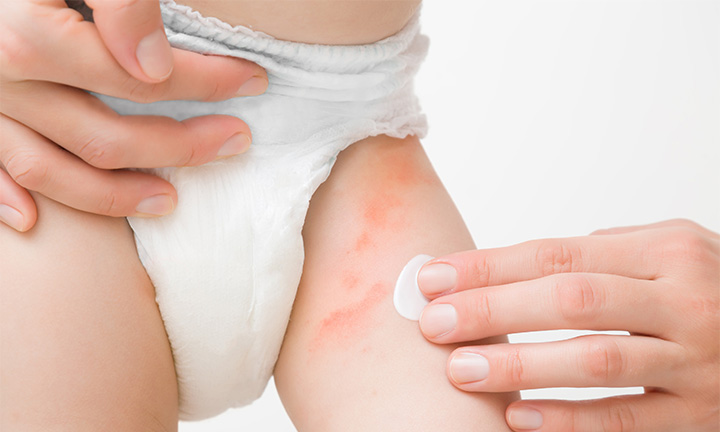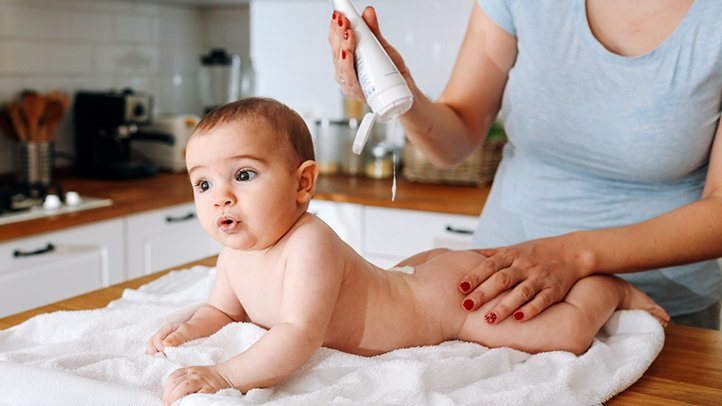10 Best Infant Skin Care Tips for New Parents
New parents, prioritize infant skin care with these expert tips. Opt for mild, fragrance-free cleansers and gentle massage techniques during baths. Keep baby’s skin hydrated with fragrance-free moisturizers in a circular motion. Shield your little one from the sun by applying SPF 30 sunscreen and dressing in protective clothing. Choose hypoallergenic products and avoid harmful substances. Combat diaper rash with gentle cleaning, zinc oxide cream, and diaper-free time. Use gentle cleansing products at bath time and maintain water temperature to prevent burns. Remember to pat dry gently and select soft fabrics for clothing. Make sure your baby’s skin stays healthy and happy!
Key Takeaways
- Use mild, fragrance-free cleansers for bathing.
- Apply SPF 30 sunscreen and protect from UV rays.
- Choose hypoallergenic, natural products approved by pediatricians.
- Prevent diaper rash with gentle cleaning and zinc oxide cream.
- Pat dry, dress in gentle fabrics, and layer clothing appropriately.
Gentle Cleansing

When caring for your newborn’s delicate skin, make sure to choose a mild, fragrance-free cleanser to gently cleanse without causing irritation. Confirm the cleanser is specifically formulated for infants to maintain the skin’s natural balance.
During bath time, use gentle massage techniques to promote circulation and relaxation. You can softly rub your baby’s skin in circular motions with a soft cloth or your fingertips. These massage techniques not only aid in cleansing but also create a soothing bonding experience between you and your little one.
Avoid harsh scrubbing or exfoliation, as your baby’s skin is sensitive and still developing. Instead, consider natural remedies like oatmeal baths for gentle exfoliation. Oatmeal is known for its calming properties and can help alleviate any dryness or irritation.
Moisturizing Daily

To keep your baby’s skin soft and supple, daily moisturizing is essential. Opt for gentle, fragrance-free products specifically formulated for infants to avoid irritation.
Hydrating your little one’s skin regularly can help maintain its natural moisture barrier and prevent dryness.
Hydrating Baby’s Skin
Regularly moisturizing your baby’s skin is essential to maintain hydration and protect against dryness and irritation. Babies have delicate skin that’s prone to dryness, especially during seasonal changes. To guarantee proper skin hydration, it’s important to use a gentle, hydrating moisturizer daily.
Hydrating your baby’s skin helps in maintaining the skin barrier, which is crucial for protecting against external irritants and preventing moisture loss.
During colder months, when the air tends to be drier, consider using a thicker moisturizing cream to provide more hydration and create a protective layer on your baby’s skin. In contrast, in warmer weather, opt for a lighter lotion that still offers adequate hydration without feeling too heavy on the skin.
When applying moisturizer, gently massage it into your baby’s skin in a circular motion. Pay extra attention to areas that are more prone to dryness, such as elbows, knees, and cheeks.
Choosing Safe Products
For ideal infant skin care, prioritize choosing safe and gentle products when moisturizing your baby daily. When selecting moisturizers for your little one, consider natural alternatives to minimize the risk of exposing their delicate skin to harsh chemicals. Be aware of potential allergens such as fragrances and dyes that may irritate your baby’s skin. Always check product expiration dates to confirm the formula is still effective and safe for use.
Take the time to research the ingredients in the products you plan to use on your baby. Look for moisturizers that are free from parabens, sulfates, and phthalates, as these can be harmful to your baby’s skin. Opt for gentle, hypoallergenic options that are specifically formulated for infants to reduce the likelihood of irritation or adverse reactions.
Sun Protection

Consider applying a broad-spectrum sunscreen with at least SPF 30 to your baby’s exposed skin when venturing outdoors to protect against harmful UV rays. This is important in safeguarding your infant’s delicate skin from sun damage.
Sunscreen application should be done generously 15-30 minutes before going outside and reapplied every two hours, or more frequently if your baby is swimming or sweating. It’s also important to dress your baby in protective clothing, such as lightweight long-sleeved shirts, pants, hats with brims, and sunglasses, to shield them from the sun’s rays.
Additionally, when outdoors, maximize shade usage to reduce direct sun exposure. Seek shade under trees, umbrellas, or canopies, especially during peak sun hours between 10 a.m. and 4 p.m.
Remember that UV rays can still reach your baby on cloudy days, so sun protection remains essential regardless of cloud cover. By following these sun protection measures, you can help keep your baby’s skin safe and healthy during outdoor activities.
Choosing Safe Products
When choosing products for your infant’s delicate skin, make sure to prioritize safety by looking for gentle, hypoallergenic options.
Be vigilant about reading ingredient labels to avoid potentially harmful substances like fragrances, dyes, and parabens.
Keeping an eye out for products with natural ingredients can also help reduce the risk of irritation or allergic reactions.
Safe Product Selection
Choosing safe products for your infant’s skincare routine is important to guarantee their delicate skin stays healthy and protected. When selecting products, opt for natural alternatives that are free from harsh chemicals and fragrances.
Look for items that have undergone rigorous product testing to make sure they’re safe for your baby’s sensitive skin.
It is essential to seek pediatrician approval before introducing any new products into your infant’s skincare regimen. Pediatricians can provide valuable insight into which ingredients to avoid and recommend suitable products based on your baby’s individual needs.
Conduct thorough ingredient research to understand what goes into the products you’re considering.
Ingredient Label Awareness
To guarantee your infant’s skin remains healthy and protected, it’s essential to carefully scrutinize ingredient labels when selecting skincare products. Conducting thorough ingredient label analysis is vital to make sure that the products you choose are safe for your baby’s delicate skin, especially if your little one has known skin sensitivities.
Look for natural alternatives to common chemicals that may pose concerns for your baby’s skin health. Ingredients like parabens, phthalates, and fragrances can often lead to irritation or allergic reactions in infants with sensitive skin. Opting for products that are free from harsh chemicals and instead contain natural, gentle ingredients can help reduce the risk of adverse reactions.
Diaper Rash Prevention

Proactively maintaining clean and dry skin is vital for preventing diaper rash in infants. When changing your baby’s diaper, make sure you clean their bottom gently with fragrance-free wipes or a soft cloth.
Diaper changing routine plays an essential role; change diapers promptly after they’re soiled to minimize skin irritation. After cleaning, apply a thin layer of diaper cream containing zinc oxide to act as a barrier against moisture and irritants. Natural remedies like coconut oil or olive oil can also help soothe and protect delicate skin.
In addition to regular diaper changes and using diaper cream, providing diaper-free time can aid in preventing diaper rash. Allowing your baby’s skin to air out for short periods throughout the day can help reduce moisture and promote healing.
Bathing Techniques
When bathing your infant, keep in mind that water temperature safety is vital to prevent scalding or chilling their delicate skin.
Choose gentle cleansing products specifically formulated for babies to avoid irritation or dryness.
After the bath, guarantee proper drying techniques by gently patting the skin with a soft towel to prevent friction and rubbing.
Water Temperature Safety
Make sure the water temperature is comfortably warm to prevent scalding when bathing your infant. Bath time is an important bonding experience, but it’s vital to take safety precautions to guarantee your baby’s well-being. Infants have delicate skin, making skin sensitivity and temperature awareness key factors in creating a safe bathing environment.
To determine the right water temperature, use a bath thermometer or test the water with your elbow or wrist. The water should be around 37-38 degrees Celsius, which is approximately body temperature. This ensures the water is warm enough to be soothing for your baby without risking burns.
Always remember to fill the tub first and then gently place your baby in the water, supporting their head and neck. Continuous supervision is essential to prevent any accidents.
After bath time, pat your baby’s skin dry with a soft towel and moisturize to keep their delicate skin hydrated. By following these steps, you can create a safe and enjoyable bathing experience for your little one.
Gentle Cleansing Products
Choose gentle cleansing products that are specifically formulated for infants to maintain the natural balance of their delicate skin during bath time. Opt for products with natural ingredients like oatmeal, chamomile, or coconut oil, which are gentle and soothing for sensitive skin. Avoid products containing harsh chemicals, fragrances, or dyes that can irritate your baby’s skin.
When selecting a cleanser, look for labels that indicate they’re hypoallergenic and dermatologist-tested to minimize the risk of allergic reactions. These products are designed to be mild and safe for your little one’s skin. Remember, less is more when it comes to cleansing your baby. A pea-sized amount of gentle cleanser is usually sufficient to clean their body without stripping away natural oils.
Prioritize products that are specifically labeled for infants, as they’re formulated to be gentle and non-irritating. Always perform a patch test on a small area of your baby’s skin before using a new product to verify they don’t have an adverse reaction. By choosing the right cleansing products, you can help keep your baby’s skin healthy and happy during bath time.
Proper Drying Techniques
To ensure your baby’s skin remains healthy and free of irritation after bath time, it’s important to pay attention to proper drying techniques. After gently cleansing your baby’s delicate skin, pat them dry with a soft towel instead of rubbing to prevent any potential irritation. Using a soft towel helps to absorb excess moisture without causing friction that could harm the skin’s barrier.
Furthermore, allowing your baby to air dry for a few moments can be beneficial. Air drying gives your baby’s skin the opportunity to breathe and reduces the risk of trapping excess moisture, which could lead to irritation or chafing.
Make sure the room is warm and free from drafts while your baby is air drying to prevent them from getting cold.
Handling Common Skin Issues

Addressing common skin issues in infants demands careful observation and prompt action to guarantee their comfort and well-being.
When it comes to rash treatment, opt for gentle baby-friendly products and avoid harsh chemicals. Consider using baby massage techniques with natural oils to soothe the skin and promote relaxation.
For eczema management, maintain a consistent newborn skincare routine with mild, fragrance-free products to prevent flare-ups. Remember to keep your baby’s skin well moisturized to reduce itchiness and irritation.
If you notice any concerning skin issues, such as persistent rashes or eczema, consult with a pediatrician for professional advice and treatment options. They may recommend specific creams or ointments to alleviate discomfort and manage the condition effectively.
Additionally, pay attention to any triggers that could worsen skin problems, such as certain fabrics or environmental factors, and make necessary adjustments to protect your infant’s delicate skin.
Clothing Considerations
When it comes to selecting clothing for your infant, consider fabrics that are gentle on their delicate skin to minimize the risk of irritation and discomfort. Opt for soft, breathable materials like cotton or bamboo, which are less likely to cause skin reactions. Make sure that the clothing is free from harsh dyes and chemicals that could potentially irritate your baby’s skin.
Size selection is important when dressing your little one. Clothes that are too tight can rub against the skin, causing irritation, while oversized garments can lead to chafing. Choose outfits that allow your baby to move comfortably without being constricted.
Weather considerations are vital in dressing your infant. In colder months, dress your baby in layers to regulate body temperature. Start with a soft base layer, add a cozy sweater or jacket, and top it off with a breathable blanket when heading outdoors.
In warmer weather, opt for lightweight, loose-fitting clothes to prevent overheating. Remember to protect your baby from the sun by dressing them in light, long-sleeved garments and a hat.
Avoiding Harsh Ingredients

Selecting skincare products for your infant involves avoiding harsh ingredients that may potentially irritate their sensitive skin. When caring for your baby’s delicate skin, it’s important to steer clear of harmful chemicals commonly found in some skincare products. Look for labels that indicate products are free from parabens, sulfates, phthalates, and artificial fragrances. These ingredients can be harsh and lead to skin irritation or allergic reactions in babies with sensitive skin. Opt for gentle, hypoallergenic options that are specifically formulated for infants to minimize the risk of adverse reactions.
To make sure your baby’s skin remains healthy and well-nourished, consider using natural or organic skincare products. Ingredients like aloe vera, chamomile, and coconut oil are known for their soothing and moisturizing properties, making them ideal choices for sensitive skin care strategies.
Before purchasing any product, carefully read the ingredient list and consult with your pediatrician if you have concerns about specific ingredients. By being mindful of what you apply to your baby’s skin, you can help protect and maintain their skin’s natural balance and health.
Regular Skin Checks
Consider incorporating regular skin checks into your baby’s care routine to monitor for any changes or concerns in their skin health. As a new parent, taking the time to inspect your infant’s skin can help catch any issues early on.
Confirm their skin hydration levels are adequate by using gentle, fragrance-free moisturizers as needed. Pay attention to any dry patches, redness, or irritation that may require special attention.
When heading outdoors, remember that infant skin is delicate and prone to sun damage. Apply sunscreen specifically formulated for babies with at least SPF 30, and reapply every two hours or after swimming or sweating. Sun protection is vital in preventing sunburns and long-term skin damage.
During your regular skin checks, look for any new moles, birthmarks, or changes in existing ones. If you notice anything unusual or concerning, consult your pediatrician promptly.
Frequently Asked Questions
How Can I Tell if My Baby Has Sensitive Skin?
If your baby has sensitive skin, watch for signs like frequent diaper rash or reactions to products. Consider allergy testing if needed. Always consult a pediatrician for guidance on caring for your little one’s delicate skin.
Should I Use Baby Lotion on My Newborn?
You should use baby lotion on your newborn sparingly. Opt for fragrance-free, hypoallergenic options to avoid irritating sensitive skin. Focus on gentle cleansing, hydration tips, and observing for any signs of skin reaction to guarantee proper care.
Can I Use Regular Sunscreen on My Baby?
Yes, you can use regular sunscreen on your baby, but it’s advisable to opt for a baby-specific formula with gentle ingredients. Make sure it offers broad-spectrum UV protection and is at least SPF 30. Apply generously and frequently for effective coverage.
How Do I Know if a Product Is Safe for My Infant?
To guarantee a product is safe for your infant, conduct ingredient analysis. Look for gentle, hypoallergenic options. Dermatologist recommendations offer valuable guidance. Prioritize products free of harsh chemicals or fragrances to protect your baby’s delicate skin.
Is It Normal for Babies to Have Dry Skin Patches?
Yes, it’s common for babies to have dry skin patches. Proper moisturizing techniques, like using fragrance-free creams, can help. Common causes include harsh weather, frequent bathing, or skin conditions. Consult a pediatrician for guidance.
Conclusion
To sum up, taking care of your infant’s delicate skin requires patience, diligence, and knowledge. By following these 10 best tips for infant skin care, you can help protect your little one from common skin issues and keep their skin healthy and glowing.
Remember to always choose gentle products, be mindful of the ingredients you use, and consult with a healthcare professional if you have any concerns. Your baby’s skin is precious, so treat it with the care and attention it deserves.

Chad Adan Kace, a young dad from Vermont, shares his parenting journey with a touch of humor and lots of love. Father to a lively baby, he explores the joys and challenges of fatherhood through his stories.







